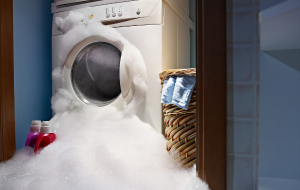 Did you know that washing machines are one of the main sources of water damage to homes? Others that top the list include hot water heaters and dishwashers. Fortunately, there are a few easy and inexpensive steps you can take help to prevent these types of losses:
Did you know that washing machines are one of the main sources of water damage to homes? Others that top the list include hot water heaters and dishwashers. Fortunately, there are a few easy and inexpensive steps you can take help to prevent these types of losses:
- Check for leaks: Thoroughly check the area around appliances for any signs of leaking every four months.
- Check supply hoses: Check the supply hoses regularly to ensure a tight connection, and no breaks or tears. It’s a good idea to replace supply hoses for washing machines and dishwashers every five years even if there are no signs of wear. Sometimes, wear only shows on the inside. Reinforced, steel braided hoses are recommended.
- Read the manual: Always refer to your manufacturer’s guidelines for types of soap and load recommendations for the washing machine and dishwasher. Most new washing machines require HE detergents.
- Flush your water heater: It is recommended to flush your water heater once per year to ensure you have fresh water and to remove sediment.
- Don’t leave running appliances unattended. Try to only operate washing machines and dishwashers when someone is at home.
- Replace hot water heater as needed. It’s recommended to replace the hot water heater when it is nearing the end of its life expectancy, even if there aren’t any problems. As the water heater ages, the risk of a slow leak or sudden burst increases.
- Leak detection systems are a great tool to monitor your appliances, and even automatically shut off water in the event of a detected leak. While there are expenses with a leak detection system, it might just score you a discount on your homeowners policy! Leak detection systems can be added to individual appliances or an entire house.
Of course, not all losses can be prevented, but following these tips should lower your chances of a loss. In the event of a water leak, it is important to know where your water shut-off valve is located so that water can quickly be turned off to minimize damage.

